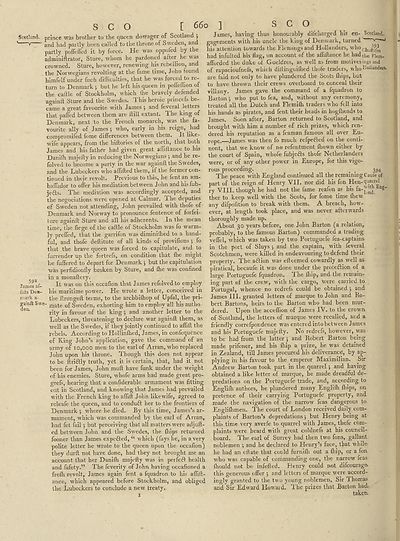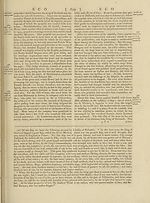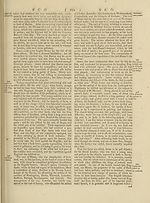Encyclopaedia Britannica, or, a Dictionary of arts, sciences, and miscellaneous literature : enlarged and improved. Illustrated with nearly six hundred engravings > Volume 18, RHI-SCR
(698) Page 660
Download files
Complete book:
Individual page:
Thumbnail gallery: Grid view | List view

SCO [660
Scotland, prince was brother to the queen dowager of Scotland •,
v and had partly been called to the throne of Sweden, and
partly poffefl’ed it by force. He was oppofed by the
adouniftrator, Sture, whom he pardoned aiter. he was
crowned. Sture, however, renewing his rebellion, and
the Norwegians revolting at the fame time, John found
himfelf under fuch difficulties, that he was forced to re¬
turn to Denmark 5 but he left his queen in poffeffion of
the caftle of Stockholm, which (he bravely defended
againit Sture and the Swedes. This heroic princefs be¬
came a great favourite with James ; and feveral letters
that palled between them are ftill extant. 1 he king of
Denmark, next to the French monarch, was the fa¬
vourite ally of James j who, early in his reign, had
compromifed fome differences between them. It like-
wife appears, from the hiftories of the north, that both
James and his father had given great affittance to his
Daniffi majefty in reducing the Nonvegians ; and he re-
folved to become a party in the war againlt the Swedes,
and the Lubeckers who affifted them, it the former con¬
tinued in their revolt. Previous to this, he fent an am-
baffador to offer his mediation between John and his fub-
jefts. The mediation was accordingly accepted, and
the negociations were opened at Calmar. Ihe deputies
of Sweden not attending, John prevailed with thofe of
Denmark and Norway to pronounce fentence of forfei¬
ture again ft Sture and all his adherents. In the mean
time, the liege of the caftle of Stockholm was fo w'arm-
]y preffed, that the garrifon was diminilhed to a hand¬
ful, and thofe deftitute of all kinds of provifions ; fo
that the brave queen was forced to capitulate, and to
furrender up the fortrefs, on condition that Ihe might
be fuffered to depart for Denmark j but the capitulation
was perfidioully broken by Sture, and Ihe was confined
in a monaftery.
It was on this occafion that James refolvedto employ
his maritime power. He wrote a letter, conceived in
the ftrongeft terms, to the archbilhop of Upfal, the pri¬
mate of Sweden, exhorting him to employ all his autho
rity in favour of the king ; and another letter to the
Lubeckers, threatening to declare war again!! them, as
well as the Swedes, if they jointly continued to affift the
rebels. According to Hollinlhed, James, in confequenee
of King John’s application, gave the command of an
army of 10,000 men to the earl of Arran, who replaced
John upon his throne. Though this does not appear
to be ftrittly truth, yet it is certain, that, had it not
been for James, John muft have funk under the weight
of his enemies. Sture, whofe arms had made great pro-
grefs, hearing that a confiderable armament was fitting
out in Scotland, and knowing that James had prevailed
with the French king to affift John likewife, agreed to
releafe the queen, and to conduft her to the frontiers of
Denmark } where he died. By this time, James’s ar¬
mament, which was commanded by the earl of Arran,
had fet fail ; but perceiving that all matters were adjuft-
ed between John and the Swedes, the ffiips returned
fooner than James expefled, “ which (fays he, in a very
polite letter he wrote to the queen upon the occalion)
they durft not have done, had they not brought me an
account that her Danifh majefty was in perfedl health
and fafety.” The feverity of John having occafioned a
frelh revolt, James again fent a fquadron to his affift-
ance, which appeared before Stockholm, and obliged
the Lubeckers to conclude a new treaty.
39a
James af-
futs Dea-
mark a-
ga’mft Swe
den.
] SCO
James, having thus honourably difeharged his en- Scotland,
gagements with his uncle the king of Denmark, turned
his attention towards the Flemings and Hollanders, whochiJ^
had infulted his flag, on account of the affiftance he had the Flem-
afforded the duke of Gueldres, as well as from motivesings and
of rapacioufneis, which diitinguilhed thofe traders, who Zanders,
are laid not only to have plundered the Scots flaps, but
to have thrown their crews overboard to conceal their
villany. James gave the command of a fquadron to
Barton ; who put to fea, and, without any ceremony,
treated all the Dutch and Flemilh traders who fell into
his hands as pirates, and fent their heads in hoglheads to
James. Soon after, Barton returned to Scotland, and
brought with him a number of rich prizes, which ren¬
dered his reputation as a feaman famous all over Eu¬
rope.—James was then fo much refpeded on the conti-
ne>nt, that we know of no refentment drown either by
the court of Spain, whofe fubje&s thofe Netherlanders
were, or of any other power in Europe, for this vigo¬
rous proceeding. _ . . 394
The peaee with England continued all the remaining Caufe of
part of the reign of Henry VII. nor did his fon Hen-Tf“r^
ry VIII. though he had not the fame reafon as his “S*"
ther to keep well with the Scots, for fome time drew
any difpofition to break with them. A breach, how¬
ever, at length took place, and was never afterwards
thoroughly made up.
About 30 years before, one John Barton (a relation,
probably, to the famous Barton) commanded a trading
veffel, which was taken by two Portuguefe fea-captains
in the port of Sluys *, and the captain, with feveral
Scotchmen, were killed in endeavouring to defend their
property. The aflion was efttemed cowardly as well as
piratical, becaufe it was done under the protedlion of a
large Portuguefe fquadron. The dfip, and the remain¬
ing part of the crew, with the cargo, were carried to
Portugal, whence no redrefs could be obtained } and
James III. granted letters of marque to John and Ro¬
bert Bartons, heirs to the Barton who had been mur¬
dered. Upon the acceffion of James IV. to the crown
of Scotland, the letters of marque were recalled, and a
friendly correfpondence was entered into between James
and his Portuguefe majefty. No redrefs, however, was
to be had from the latter j and Robert Barton being
made prifoner, and his fhip a prize, he was detained
in Zealand, till James procured his deliverance’, by ap¬
plying in his favour to the emperor Maximilian. Sir
Andrew Barton took part in the quarrel; and having
obtained a like letter of marque, he made dreadful de¬
predations on the Portuguefe trade, and, according to
Englilh authors, he plundered many Englilh Ihips, on
pretence of their carrying Portuguefe property, and
made the navigation of the narrow7 feas dangerous to.
Englilhmen. The court of London received daily com¬
plaints of Barton’s depredations j but Henry being at
this time very averfe to quarrel with James, thefe com¬
plaints were heard with great coldnefs at his council-
board. The earl of Surrey had then two fons, gallant
noblemen ; and he declared to Henry’s face, that while
he had an eftate that could furnilh out a Ihip, or a fon
who was capable of commanding one, the narrow feas
Ihould not be infefted. Henry could not difeourage-
this generous offer ; and letters of marque were accord-
ingly granted to the two young noblemen, Sir Thomas
and Sir Edward Howaid. The prizes that Barton had
taken
Scotland, prince was brother to the queen dowager of Scotland •,
v and had partly been called to the throne of Sweden, and
partly poffefl’ed it by force. He was oppofed by the
adouniftrator, Sture, whom he pardoned aiter. he was
crowned. Sture, however, renewing his rebellion, and
the Norwegians revolting at the fame time, John found
himfelf under fuch difficulties, that he was forced to re¬
turn to Denmark 5 but he left his queen in poffeffion of
the caftle of Stockholm, which (he bravely defended
againit Sture and the Swedes. This heroic princefs be¬
came a great favourite with James ; and feveral letters
that palled between them are ftill extant. 1 he king of
Denmark, next to the French monarch, was the fa¬
vourite ally of James j who, early in his reign, had
compromifed fome differences between them. It like-
wife appears, from the hiftories of the north, that both
James and his father had given great affittance to his
Daniffi majefty in reducing the Nonvegians ; and he re-
folved to become a party in the war againlt the Swedes,
and the Lubeckers who affifted them, it the former con¬
tinued in their revolt. Previous to this, he fent an am-
baffador to offer his mediation between John and his fub-
jefts. The mediation was accordingly accepted, and
the negociations were opened at Calmar. Ihe deputies
of Sweden not attending, John prevailed with thofe of
Denmark and Norway to pronounce fentence of forfei¬
ture again ft Sture and all his adherents. In the mean
time, the liege of the caftle of Stockholm was fo w'arm-
]y preffed, that the garrifon was diminilhed to a hand¬
ful, and thofe deftitute of all kinds of provifions ; fo
that the brave queen was forced to capitulate, and to
furrender up the fortrefs, on condition that Ihe might
be fuffered to depart for Denmark j but the capitulation
was perfidioully broken by Sture, and Ihe was confined
in a monaftery.
It was on this occafion that James refolvedto employ
his maritime power. He wrote a letter, conceived in
the ftrongeft terms, to the archbilhop of Upfal, the pri¬
mate of Sweden, exhorting him to employ all his autho
rity in favour of the king ; and another letter to the
Lubeckers, threatening to declare war again!! them, as
well as the Swedes, if they jointly continued to affift the
rebels. According to Hollinlhed, James, in confequenee
of King John’s application, gave the command of an
army of 10,000 men to the earl of Arran, who replaced
John upon his throne. Though this does not appear
to be ftrittly truth, yet it is certain, that, had it not
been for James, John muft have funk under the weight
of his enemies. Sture, whofe arms had made great pro-
grefs, hearing that a confiderable armament was fitting
out in Scotland, and knowing that James had prevailed
with the French king to affift John likewife, agreed to
releafe the queen, and to conduft her to the frontiers of
Denmark } where he died. By this time, James’s ar¬
mament, which was commanded by the earl of Arran,
had fet fail ; but perceiving that all matters were adjuft-
ed between John and the Swedes, the ffiips returned
fooner than James expefled, “ which (fays he, in a very
polite letter he wrote to the queen upon the occalion)
they durft not have done, had they not brought me an
account that her Danifh majefty was in perfedl health
and fafety.” The feverity of John having occafioned a
frelh revolt, James again fent a fquadron to his affift-
ance, which appeared before Stockholm, and obliged
the Lubeckers to conclude a new treaty.
39a
James af-
futs Dea-
mark a-
ga’mft Swe
den.
] SCO
James, having thus honourably difeharged his en- Scotland,
gagements with his uncle the king of Denmark, turned
his attention towards the Flemings and Hollanders, whochiJ^
had infulted his flag, on account of the affiftance he had the Flem-
afforded the duke of Gueldres, as well as from motivesings and
of rapacioufneis, which diitinguilhed thofe traders, who Zanders,
are laid not only to have plundered the Scots flaps, but
to have thrown their crews overboard to conceal their
villany. James gave the command of a fquadron to
Barton ; who put to fea, and, without any ceremony,
treated all the Dutch and Flemilh traders who fell into
his hands as pirates, and fent their heads in hoglheads to
James. Soon after, Barton returned to Scotland, and
brought with him a number of rich prizes, which ren¬
dered his reputation as a feaman famous all over Eu¬
rope.—James was then fo much refpeded on the conti-
ne>nt, that we know of no refentment drown either by
the court of Spain, whofe fubje&s thofe Netherlanders
were, or of any other power in Europe, for this vigo¬
rous proceeding. _ . . 394
The peaee with England continued all the remaining Caufe of
part of the reign of Henry VII. nor did his fon Hen-Tf“r^
ry VIII. though he had not the fame reafon as his “S*"
ther to keep well with the Scots, for fome time drew
any difpofition to break with them. A breach, how¬
ever, at length took place, and was never afterwards
thoroughly made up.
About 30 years before, one John Barton (a relation,
probably, to the famous Barton) commanded a trading
veffel, which was taken by two Portuguefe fea-captains
in the port of Sluys *, and the captain, with feveral
Scotchmen, were killed in endeavouring to defend their
property. The aflion was efttemed cowardly as well as
piratical, becaufe it was done under the protedlion of a
large Portuguefe fquadron. The dfip, and the remain¬
ing part of the crew, with the cargo, were carried to
Portugal, whence no redrefs could be obtained } and
James III. granted letters of marque to John and Ro¬
bert Bartons, heirs to the Barton who had been mur¬
dered. Upon the acceffion of James IV. to the crown
of Scotland, the letters of marque were recalled, and a
friendly correfpondence was entered into between James
and his Portuguefe majefty. No redrefs, however, was
to be had from the latter j and Robert Barton being
made prifoner, and his fhip a prize, he was detained
in Zealand, till James procured his deliverance’, by ap¬
plying in his favour to the emperor Maximilian. Sir
Andrew Barton took part in the quarrel; and having
obtained a like letter of marque, he made dreadful de¬
predations on the Portuguefe trade, and, according to
Englilh authors, he plundered many Englilh Ihips, on
pretence of their carrying Portuguefe property, and
made the navigation of the narrow7 feas dangerous to.
Englilhmen. The court of London received daily com¬
plaints of Barton’s depredations j but Henry being at
this time very averfe to quarrel with James, thefe com¬
plaints were heard with great coldnefs at his council-
board. The earl of Surrey had then two fons, gallant
noblemen ; and he declared to Henry’s face, that while
he had an eftate that could furnilh out a Ihip, or a fon
who was capable of commanding one, the narrow feas
Ihould not be infefted. Henry could not difeourage-
this generous offer ; and letters of marque were accord-
ingly granted to the two young noblemen, Sir Thomas
and Sir Edward Howaid. The prizes that Barton had
taken
Set display mode to:
![]() Universal Viewer |
Universal Viewer | ![]() Mirador |
Large image | Transcription
Mirador |
Large image | Transcription
Images and transcriptions on this page, including medium image downloads, may be used under the Creative Commons Attribution 4.0 International Licence unless otherwise stated. ![]()
| Permanent URL | https://digital.nls.uk/193027781 |
|---|
| Attribution and copyright: |
|
|---|
| Description | Ten editions of 'Encyclopaedia Britannica', issued from 1768-1903, in 231 volumes. Originally issued in 100 weekly parts (3 volumes) between 1768 and 1771 by publishers: Colin Macfarquhar and Andrew Bell (Edinburgh); editor: William Smellie: engraver: Andrew Bell. Expanded editions in the 19th century featured more volumes and contributions from leading experts in their fields. Managed and published in Edinburgh up to the 9th edition (25 volumes, from 1875-1889); the 10th edition (1902-1903) re-issued the 9th edition, with 11 supplementary volumes. |
|---|---|
| Additional NLS resources: |
|

